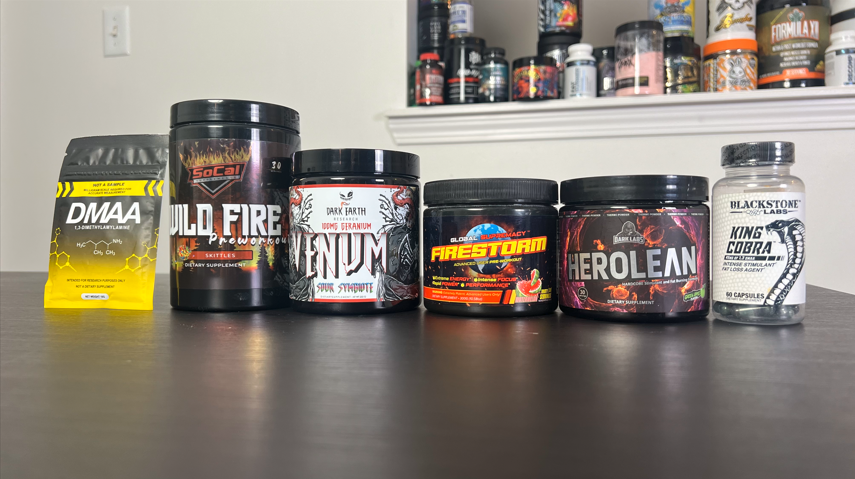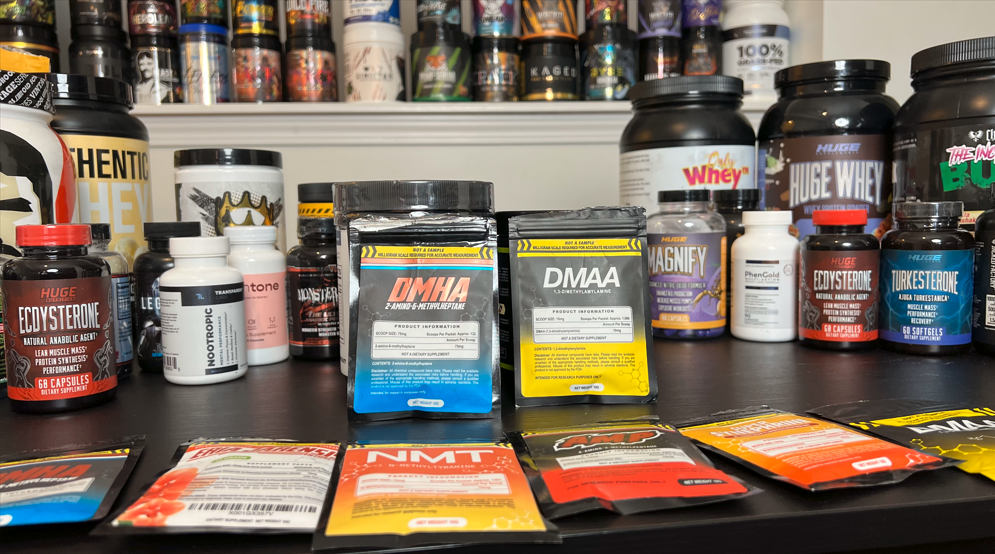DMAA, or 1,3-dimethylamylamine, is a stimulant known for its powerful energy-boosting capabilities.
Found in pre-workout and weight-loss supplements, DMAA's popularity is undeniable.
However, its safety profile has been under scrutiny, leading to a divide in opinions and research findings.
This article explores DMAA's safety, backed by scientific evidence and regulatory perspectives.
Our goal is to provide a comprehensive overview of what DMAA is, its benefits, the concerns surrounding its use, and the latest in scientific research and legal standings.
Whether you're a fitness enthusiast considering DMAA supplements or simply curious, this article aims to equip you with the information you need to make informed decisions.

DMAA: Quick Overview
DMAA is a synthetic stimulant that enhances energy and focus, making it popular in fitness supplements.
While some users report significant performance benefits, concerns about safety and legality persist.
This overview examines DMAA's effects, balancing its potential for boosting workouts against the risks and regulatory debates it faces.

From Passion to Platform: The Story Behind FitFrek
As the founder of FitFrek, my journey in the fitness world has been both personal and professional.
Starting in 2004 as a 100lb skinny guy, I embarked on a transformation that not only changed my physique but also deepened my understanding of fitness and supplementation.
Over the years, my experiences with various supplements, including DMAA, have shaped my approach to fitness, emphasizing the importance of informed decision-making.
Building on Experience:
- My transformation to a 200lb muscular athlete over 15 years has given me a firsthand look at the power of dedication and the right supplements.
- Launching FitFrek in 2013 was a natural progression, aiming to share my learned insights and honest supplement reviews with a wider audience.
Guiding Principles:
- At FitFrek, we prioritize unbiased, evidence-based information to help you navigate the complex world of fitness supplements.
- My commitment is to offer guidance and support to those looking to enhance their fitness journey, drawing from my extensive personal and professional experiences.

DMAA Unveiled: Effects and Insights
DMAA, a synthetic compound found in numerous pre-workout and weight-loss supplements, is renowned for its potent stimulant effects.
It promises to elevate energy levels, enhance focus, and improve overall workout performance.
However, the discussion around DMAA is not without controversy, especially concerning its safety and side effects.
Understanding DMAA:
- What It Is: A powerful stimulant that mimics adrenaline, enhancing physical and cognitive performance.
- Usage: Predominantly found in fitness supplements, aimed at boosting energy and focus.
The Benefits Explored:
- Energy Surge: Users often report a significant boost in energy, allowing for more intense and prolonged workouts.
- Sharper Focus: Beyond physical energy, DMAA is said to improve mental focus, aiding athletes in maintaining concentration during their training sessions.
Navigating the Risks:
- Potential Side Effects: While DMAA can offer notable benefits, it's also associated with risks such as elevated blood pressure, cardiovascular strain, and, in some cases, more severe health complications.
- Regulatory Scrutiny: Due to these potential risks, DMAA has faced significant regulatory attention, leading to its ban or restriction in several countries.
Informed Use Is Key:
- Making an informed decision about DMAA involves weighing its potential benefits against the possible risks. Users must consider their health status and consult healthcare professionals when contemplating DMAA's inclusion in their fitness regimen.
The Science Behind DMAA: Mechanisms and Effects
DMAA operates by mimicking the body's adrenaline, leading to increased heart rate, heightened alertness, and a surge in energy levels. This action not only boosts physical performance but also sharpens mental focus, making it a popular choice for pre-workout supplements.
Mechanism of Action:
- DMAA stimulates the central nervous system, similar to adrenaline and other stimulants like caffeine.
- It triggers the release of norepinephrine, a neurotransmitter that enhances alertness and energy.
Physical Benefits:
- Enhanced Performance: Users report improved endurance and strength during workouts.
- Increased Energy: Provides a rapid energy boost that can improve exercise intensity.
Cognitive Benefits:
- Focus and Concentration: Helps maintain high levels of concentration and focus throughout workouts.
Understanding the Risks:
- Despite its benefits, DMAA's stimulant effects can lead to cardiovascular issues, such as increased blood pressure and heart rate, particularly in sensitive individuals or when used excessively.
Regulatory and Health Considerations:
- The potent effects of DMAA have led to scrutiny by health authorities, resulting in bans and restrictions in several countries due to safety concerns.
Incorporating DMAA into a fitness routine requires a careful balance, considering both its potential for enhancing workout performance and the associated health risks.
DMAA Benefits: Beyond the Hype
While DMAA's reputation is often shadowed by safety concerns, its benefits cannot be overlooked, especially for those seeking an extra edge in their fitness routines. Here’s a closer look at the advantages reported by users and supported by some studies.
Enhanced Physical Performance:
- Endurance and Strength: Many users experience a noticeable improvement in their endurance and strength during workouts, allowing for more intense and longer sessions.
- Energy Boost: The immediate surge in energy is one of DMAA's most sought-after effects, helping athletes push through tough workouts.
Improved Cognitive Function:
- Focus: DMAA aids in sharpening focus, crucial for maintaining motivation and concentration during physically demanding activities.
- Reaction Time: Some users report quicker reaction times, which can be beneficial in sports and exercises requiring fast responses.
Weight Loss Support:
- Appetite Suppression: Anecdotal evidence suggests DMAA may help suppress appetite, supporting weight loss efforts alongside exercise and diet.
- Metabolic Boost: The stimulant properties of DMAA are believed to increase metabolism, potentially aiding in fat burning.
Considerations for Use:
- While these benefits are compelling, they come with the caveat of potential risks, especially when DMAA is used without adherence to recommended dosages or by individuals with certain health conditions.
Incorporating DMAA into a fitness regimen should be approached with a balanced understanding of its potential to enhance performance against the backdrop of health and safety considerations.
Side Effects: The Other Side of DMAA
Despite DMAA's popularity for its performance-enhancing effects, it's crucial to acknowledge the potential side effects associated with its use.
Understanding these risks is essential for anyone considering DMAA as part of their supplement regimen.
Cardiovascular Risks:
- Increased Blood Pressure: One of the most common side effects, which could pose risks for individuals with pre-existing heart conditions.
- Elevated Heart Rate: Users may experience a significant increase in heart rate, leading to discomfort or more serious cardiac issues.
Mental and Emotional Effects:
- Jitters and Anxiety: The stimulant nature of DMAA can lead to feelings of restlessness or anxiety in some users.
- Potential for Dependency: Like other stimulants, there's a risk of developing a dependency on DMAA, especially with regular use.
Other Health Concerns:
- Headaches and Insomnia: The increased alertness can sometimes result in headaches or difficulty sleeping.
- Risk of Severe Reactions: In rare cases, DMAA has been linked to more severe health issues, including liver damage and strokes.
Navigating Usage:
- Given these potential side effects, it's advisable to start with lower doses to assess individual tolerance.
- Users with any pre-existing health conditions should consult with a healthcare professional before incorporating DMAA into their routine.
While DMAA can offer significant benefits for workout performance and focus, weighing these advantages against the possible health risks is crucial.
Responsible use, informed by a thorough understanding of both the positive and negative effects, is key to safely leveraging DMAA's potential.
DMAA vs. Other Stimulants: A Comparative Look
In the realm of fitness supplements, DMAA is just one of many stimulants available to those seeking enhanced performance and focus.
Comparing DMAA to other popular stimulants can help users make informed decisions based on their specific needs and health considerations.
DMAA vs. Caffeine:
- Caffeine is more widely accepted and researched, known for its moderate stimulant effects and lower risk profile. It enhances alertness and endurance with fewer reported side effects.
- DMAA offers a more intense energy boost and focus enhancement but comes with a higher risk of adverse effects, particularly on cardiovascular health.
DMAA vs. Ephedrine:
- Ephedrine, once popular in weight-loss supplements, has been largely banned due to its strong cardiovascular effects and potential for misuse.
- DMAA shares some of ephedrine's potent stimulant properties but also faces similar regulatory scrutiny and health concerns.
DMAA vs. Beta-Alanine:
- Beta-Alanine is a non-stimulant that improves performance by buffering acid in muscles, reducing fatigue. It's known for its safety and lack of stimulant-related side effects.
- DMAA's stimulant effect directly increases energy and focus, offering a different kind of performance enhancement.
Considerations for Choosing a Stimulant:
- Personal Health: Individuals with pre-existing health conditions, especially related to the heart, may opt for safer alternatives like caffeine or beta-alanine.
- Desired Effects: Those seeking a significant boost in energy and focus might lean towards DMAA, despite the risks, while others may prefer the steadier, safer enhancement from caffeine.
- Regulatory Compliance: Athletes subject to drug testing should consider the legal status and acceptance of these substances in their sport.
Choosing the right stimulant involves balancing desired outcomes with health and safety considerations.
While DMAA can offer unparalleled energy and focus, its potential risks make it crucial to evaluate alternatives and consult healthcare professionals before use.
Legal Status and Safety Concerns
The legal landscape surrounding DMAA has been as dynamic as the debates about its safety.
Understanding the current regulatory status of DMAA is crucial for anyone considering its use, as it impacts availability and compliance with sports organizations.
Regulatory Actions Against DMAA:
- FDA Warnings: The U.S. Food and Drug Administration (FDA) has issued warnings about DMAA, stating it poses health risks and should not be in dietary supplements.
- International Bans: Several countries have followed suit, restricting or outright banning DMAA due to safety concerns.
Safety Concerns:
- The primary safety concerns with DMAA revolve around its cardiovascular effects, including increased blood pressure and heart rate, which can lead to more severe health issues.
- Reports of adverse events, including cases of serious harm and even death, have contributed to its scrutinized status.
Impact on Athletes and Consumers:
- Athletic Compliance: DMAA is banned by major sports organizations, including the World Anti-Doping Agency (WADA) and the NCAA. Athletes found with DMAA in their system may face disqualification or suspension.
- Consumer Awareness: Those considering DMAA supplements must stay informed about the legal status in their region and potential health risks.
Navigating the Legal Landscape:
- Before purchasing or using DMAA-containing supplements, verify the substance's legal status in your country and any specific regulations that may apply.
- Athletes should consult their sport's governing body's banned substance list to avoid unintentional doping violations.
The evolving legal status of DMAA underscores the importance of staying updated on regulatory changes.
While DMAA can offer significant benefits for workout performance, the associated legal and safety concerns necessitate a cautious and informed approach to its use.
User Experiences with DMAA
Individuals who've incorporated DMAA into their fitness routines report a spectrum of outcomes, from significant performance enhancements to encounters with adverse effects.
While many report positive effects, others have experienced side effects, highlighting the importance of understanding DMAA's potential risks.
Here's a glimpse into the diverse experiences:
- Enhanced Workouts: Many users describe a marked increase in energy and endurance, allowing for more intense training sessions.
- Improved Focus: Some attest to DMAA's ability to sharpen focus, making it easier to stay engaged and motivated during workouts.
- Varied Reactions: While many report positive effects, others have experienced side effects such as jitteriness, elevated heart rate, and difficulty sleeping.
These firsthand accounts underscore the importance of personal tolerance levels and the need for responsible use.
Navigating DMAA Use: Dosage and Safety Tips
To safely benefit from DMAA, consider the following guidelines:
- Start Low: Begin with the lowest possible dose to assess your tolerance.
- Consult Professionals: Speak with a healthcare provider, especially if you have pre-existing health conditions.
- Monitor Effects: Pay attention to how your body responds and adjust usage accordingly.
- Legal and Athletic Compliance: Ensure DMAA's use aligns with local regulations and, if you're an athlete, with your sport's governing body.
For those considering adding DMAA to their regimen, it's crucial to start with a safe dosage and to be aware of the legal status of DMAA in your area.

FAQs: Quick Answers to Your DMAA Questions
Can DMAA improve workout performance?
Yes, many users report enhanced energy and focus, contributing to better workouts.
Is DMAA legal?
The legal status of DMAA varies by country and it's important to stay informed to ensure compliance.
What are common side effects of DMAA?
Users have reported increased heart rate, jitteriness, and elevated blood pressure among other side effects.
How should DMAA be dosed?
It's crucial to start with a low dose to assess individual tolerance and never exceed recommended amounts.
Can DMAA cause a positive drug test?
Learn more about DMAA and drug test results to navigate use in competitive sports.
Conclusion: Making an Informed Decision on DMAA
DMAA presents a compelling option for those seeking to amplify their fitness regimen, offering notable benefits like increased energy and improved focus.
However, the potential for side effects and the complex legal landscape surrounding its use demand careful consideration.
In making an informed decision about DMAA, consider exploring alternatives to DMAA for enhancing workout performance, and always stay updated on the latest research and legal developments
By weighing the user experiences, adhering to safety guidelines, and staying informed about legal restrictions, individuals can make educated decisions about incorporating DMAA into their supplement strategy.
Ultimately, the key to leveraging DMAA effectively lies in balancing its advantages with a mindful approach to health and compliance.





 About FitFrek
About FitFrek